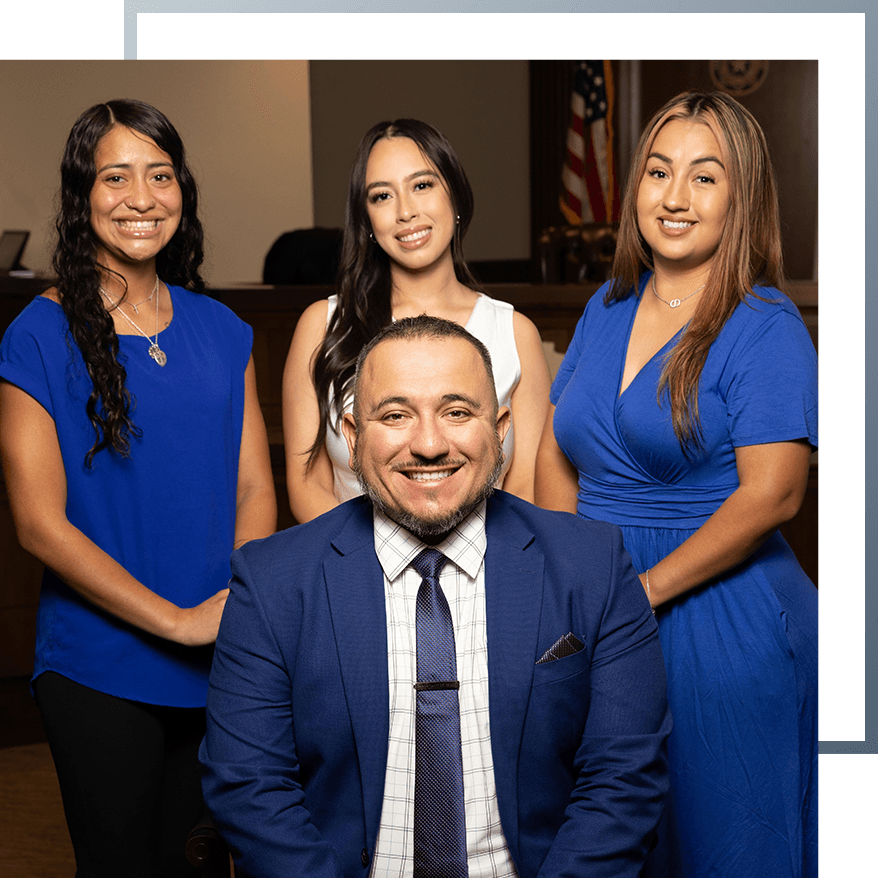
What Is the Legal Definition of DWI in Texas?
Under Texas law, a person commits a DWI offense if they operate a motor vehicle in a public place while intoxicated.
"Intoxicated" refers to:
- Lacking the normal use of mental or physical faculties due to the consumption of alcohol, a controlled substance, a drug, a dangerous drug, a combination of two or more substances, or any other substance.
- Having a blood alcohol concentration (BAC) of 0.08 or higher.
You can be arrested for DWI with a BAC lower than .08 if you are visibly impaired as a result of alcohol or drugs. This threshold is lowered to .04 for CDL drivers while operating a commercial vehicle. For drivers under 21, you can be arrested for any amount of drugs or alcohol detected in your system.
Understanding the legal framework of DWI is crucial due to its implications. Legal outcomes in DWI cases heavily depend on the specifics of the offense and any prior convictions. Knowing the thresholds that define intoxication helps in forming effective legal strategies. Moreover, laws continually evolve with new legislation addressing substance use, thus requiring informed legal guidance. At Sarabia Law Firm, we continually update our practices to align with these changes and provide clients with comprehensive legal advice to safeguard their rights and future.
DWI Factors Requiring Thorough Investigation
A DWI case involves a multitude of factors that must be meticulously examined by your attorney, including:

What Are the Penalties for a First Offense DWI in Texas?
The penalties for a first-offense DWI include:
- A fine of up to $2,000
- Jail time of up to 180 days with three mandatory days
- License suspension up to a year
These penalties increase if your BAC measures .15% or more in a first offense and with repeat offenses regardless of how long ago your prior convictions occurred.
The implications of these penalties extend beyond immediate legal consequences; they can severely impact your everyday life, from personal relationships to professional opportunities. The economic burden of fines and the potential loss of current and future income due to job loss or job suspension can be substantial. Additionally, a suspended license can drastically limit your mobility, complicating daily logistics like commuting to work or running errands. At Sarabia Law Firm, we're committed to assessing all potential penalties and exploring every legal avenue to mitigate them effectively.
Occupational Licenses in Texas
You may request an occupational license with the condition of installing and maintaining an ignition interlock device in your vehicle. This special type of restricted driver's license allows individuals whose regular driver's licenses have been suspended or revoked to drive legally under specific circumstances.
It is particularly beneficial for individuals who need to drive to maintain their livelihood, such as to get to and from work, perform job-related duties, or attend school. An occupational license is also called an "essential need" license.
To obtain an occupational license, you must file a request with the court and provide a valid reason for needing the permit. The court will then determine the necessity and scope of the license, often imposing specific restrictions, such as limiting the hours, locations, and purposes for which you can drive.
Moreover, you may be required to provide proof of insurance and periodically report your driving activities to the court. The process can vary depending on the county and the specific circumstances of the suspension.
Plea Bargains in Texas DWI Cases
A Texas DWI charge may be reduced through a plea deal, although this largely depends on the specifics of the case, the evidence available, and the skill of your defense attorney.
A common form of plea deal in DWI cases is reducing the charge to a lesser offense, such as "obstruction of a highway" or "reckless driving." These charges generally carry less severe penalties and longer-term consequences than a DWI conviction.
If a plea deal is reached, the defendant's DWI charge can be downgraded, which can lead to differing outcomes:
- Reduced fines: Lesser charges typically come with lower fines and less severe penalties than those associated with a DWI conviction.
- Lower jail time: A reduced charge may result in a lower range of possible jail time or probation instead of incarceration.
- Shorter license suspension: The duration of a driver's license suspension may be shorter, or it might be possible to negotiate terms for maintaining limited driving privileges.
- Community service and education: A plea deal might include community service hours or mandatory participation in alcohol education programs instead of harsher penalties.
- Avoidance of DWI conviction on your record: A reduced charge can help you avoid having a DWI conviction on your permanent record; this can reduce the long-term impacts on employment opportunities, insurance rates, and personal reputation.
To pursue a plea deal, your Odessa DWI attorney will typically negotiate with the prosecutor, highlighting weaknesses in the evidence or procedural errors in the case. The ultimate decision to offer a plea deal rests with the prosecutor's office, which will consider factors such as your criminal history, the severity of the offense, and public safety concerns.
Understanding the intricacies of navigating plea bargains is crucial for minimizing the consequences of a DWI charge. Our team at Sarabia Law Firm informs clients of all available options and potential outcomes to make informed decisions. By meticulously preparing a defense and leveraging our extensive knowledge of the local legal system, we strive to secure the most favorable resolutions. Even when a plea bargain seems like the best option, we continue to work diligently to negotiate the most advantageous terms possible.
Odessa DWI Defense FAQ:
How can a DWI conviction impact my driving record and insurance rates in Texas, and what steps can be taken to mitigate these effects?
A DWI conviction in Texas can significantly impact your driving record and insurance rates. Here's how:
- Driving Record: A DWI conviction will appear on your driving record, which can lead to points being added. This can result in the suspension or revocation of your driver's license, depending on the severity and frequency of offenses.
- Insurance Rates: Insurance companies view DWI convictions as a high-risk factor, often leading to increased premiums. You may also face difficulty finding an insurer willing to cover you, or you might be required to obtain SR-22 insurance, which is a certificate of financial responsibility.
To mitigate these effects, consider the following steps:
- Legal Assistance: Work with a skilled attorney to explore options like reducing charges or negotiating plea deals that might lessen the impact on your record.
- Defensive Driving Courses: Completing a state-approved defensive driving course can sometimes help reduce points on your license.
- Rehabilitation Programs: Participation in alcohol education or rehabilitation programs may demonstrate responsibility and potentially influence court or insurance decisions.
- Shop Around for Insurance: After a DWI, compare insurance quotes from different providers to find the best rates available.
- Maintain a Clean Record: Avoid further traffic violations to prevent additional points and demonstrate improved driving behavior over time.
Taking proactive steps and seeking professional guidance can help manage the consequences of a DWI conviction on your driving record and insurance rates.
What should I know about Texas’s implied consent laws, and how could they affect my DWI case or license status?
Texas's implied consent laws mean that by driving on Texas roads, you automatically consent to submit to chemical tests (like breath or blood tests) if lawfully arrested by an officer who suspects you of driving while intoxicated (DWI).
Here's how these laws can affect your DWI case or license status:
- Refusal Penalties: If you refuse to take a chemical test, your driver's license can be automatically suspended, regardless of whether you are ultimately convicted of DWI. The suspension period is typically 180 days for a first refusal and can be longer for subsequent refusals.
- Evidence in Court: Refusing a test can be used as evidence against you in court, potentially suggesting that you were aware of your intoxication. This can complicate your defense strategy.
- Administrative License Revocation (ALR): Upon refusal, you may face an ALR, which is a separate civil process from the criminal DWI case. You have a limited time (usually 15 days) to request a hearing to contest the suspension.
- Impact on Defense: While refusal can lead to license suspension, it might also limit the evidence available to the prosecution, as there won't be a chemical test result to use against you. This can be a double-edged sword, depending on the specifics of your case.
If I have prior DWI convictions, how does that affect my current charges and potential penalties in Odessa?
Having prior DWI convictions can significantly impact your current charges and potential penalties in Odessa, Texas. Here's how:
- Enhanced Charges: A prior DWI conviction can elevate a new DWI charge to a more serious offense. For example, a second DWI is typically charged as a Class A misdemeanor, while a third DWI can be charged as a third-degree felony.
- Increased Penalties: With each subsequent DWI conviction, the penalties become more severe. This can include longer jail sentences, higher fines, and extended license suspensions. For instance, a second DWI conviction may result in up to one year in jail, while a third conviction could lead to 2-10 years in prison.
- Longer License Suspension: Repeat offenders face longer periods of license suspension or revocation. You may also be required to install an ignition interlock device on your vehicle as a condition for license reinstatement.
- Impact on Probation: If you are on probation for a previous DWI, a new charge can lead to probation revocation and additional penalties.
- Harsher Court Stance: Judges and prosecutors may take a tougher stance on repeat offenders, which can influence plea negotiations and sentencing.
Given these potential consequences, it's crucial to work with an experienced criminal defense attorney who can help navigate the complexities of your case, explore options for reducing charges, and advocate for the best possible outcome.


Let Sarabia Law Firm Work for You
Given the complexities of DWI law and investigations, plea deal negotiations, or courtroom trials, having an experienced attorney is crucial. Our skilled team can advocate aggressively on your behalf, navigate the negotiation process, or apply our courtroom skills before a judge to pursue a favorable outcome. We draw on years of practical experience resolving DWI charges both in and out of court for clients in and around Odessa, Ector County, and Midland.
Our understanding of local court systems and our extensive network in the Midland legal community enhances our ability to provide effective defense strategies tailored to each client. We continually engage in professional development to ensure our strategies reflect the latest best practices and legal innovations. With Sarabia Law Firm by your side, you benefit from a robust defense team prepared to face any challenge head-on, striving to reduce or dismiss charges whenever possible.
Understanding DUI Laws in Midland
In Midland, understanding the nuances of DUI laws is essential for those accused of such offenses. A DUI charge can originate from driving under the influence of alcohol, illegal drugs, or even prescription medications. Midland enforces strict DUI laws to deter dangerous driving behaviors and ensure public safety. The implications of a DUI conviction can extend far beyond immediate penalties, especially given Texas's firm stance on drunk driving. Therefore, those facing such allegations need comprehensive legal advice to navigate the complexities involved.
Sarabia Law Firm utilizes local legal knowledge to fight DUI charges effectively. We dissect each aspect of the arrest, from the roadside tests administered to the procedures followed by law enforcement, ensuring no detail is overlooked. By leveraging insights into Midland's DUI laws, we create robust defense strategies that reflect each client's unique circumstances. Our commitment to upholding clients' rights remains steadfast, whether we are in negotiations or in a courtroom setting.
The Role of Community in DWI Prevention
Communities like Midland play a crucial role in DWI prevention through awareness programs and initiatives aimed at educating the public on the dangers and consequences of impaired driving. Schools, local organizations, and law enforcement agencies often collaborate to facilitate workshops and campaigns that emphasize the importance of safe driving habits. Such community-based efforts are vital in reducing the incidence of DWI offenses by proactive engagement with citizens across all age groups.
Sarabia Law Firm supports these efforts, understanding that community involvement is key to maintaining safety on the roads. We believe in contributing to a culture that promotes informed decisions about alcohol consumption and driving. Through our legal guidance, we aim to not only defend our clients but also educate them to avoid future infractions. Engaging with community initiatives reaffirms our commitment to being a responsible and integral part of the Midland community.
Discuss the details of your case with an Odessa DWI attorney by contacting us at (432) 224-8036.

Why Clients Choose Sarabia Law Firm
What Sets Our Team Apart?
-
Local AdvocacyWe are deeply rooted in your community and understand the local legal landscape. This enhances our ability to effectively represent you, as we are familiar with the nuances of the local courts and legal environment.
-
Comprehensive SupportFrom start to finish, we guide you through the entire legal process with unwavering support.
-
Straightforward and Honest RepresentationAt our firm, we prioritize transparency. Our goal is to equip you with the clear and actionable advice you need to navigate your legal challenges effectively.
-
Free ConsultationsTake the first step toward a strong defense with our free consultation, providing personalized legal advice and a strategic plan tailored to your unique situation at no cost.